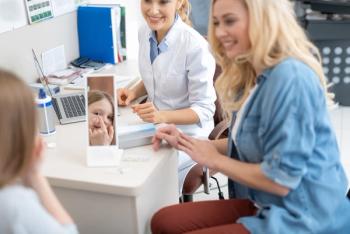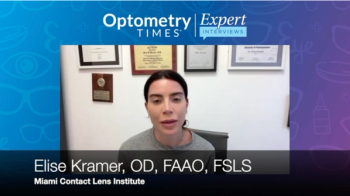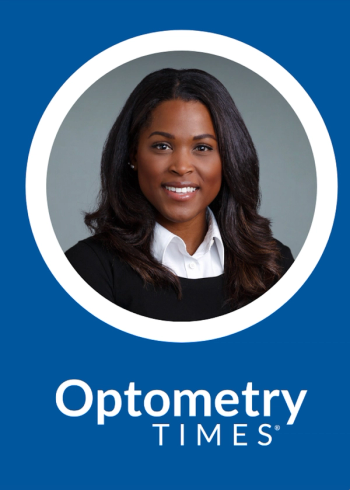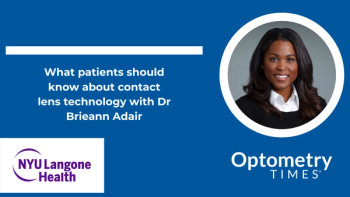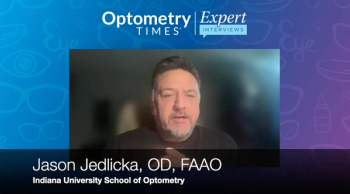
Contact lens wear still safe amid COVID-19
Gretchyn Bailey, NCLC, FAAO: Hi, everyone. I am Gretchyn Bailey. I am editor in chief of Optometry Times® and I am joined today by Dr. Ed Bennett. Dr. Bennett is executive director and president of the GP Lens Institute (GPLI). In addition, he is professor emeritus at the University of Missouri St. Louis College of optometry. Ed, thanks so much for talking with me today.
Edward S. Bennett, OD, MSEd, FAAO: Thanks for having me today, Gretchyn. I am excited to be part of it.
Bailey: Sure. Well, I wanted to talk to you a bit about contact lens safety because I know during this novel coronavirus pandemic, there has been some misinformation out there about the safety of contact lens wear, both on the part of doctors, contact lens fitters and patients. And people aren't really understanding what is safe and what isn't. So, can we talk for a minute about what is being done by optometry to address contact lens safety during COVID-19?
Bennett: I would love to talk about it, Gretchyn, you hit the key word: misinformation. I think there is a lot of knowledge out in the press that has gotten to the consumer that perhaps contact lenses should not be worn while the COVID-19 pandemic is going on. And the fact remains that there is no evidence to associate contact lens wear causing COVID-19. And that was even supported by the Centers for Disease Control (CDC) this week. So, we know that contact lenses are safe.
We always recommend, as we have in the past, that you know, if you are wearing disposable lenses, daily disposables, throw them away as soon as you get done wearing them. If you are wearing two weekly, monthly, longer replacement lenses, always clean and disinfect them as recommended by your eyecare professional. Throw your cases away every week. Most important, and I know you have never heard this before: wash your hands thoroughly prior to inserting and removing.
Whether it is COVID-19 or any type of illness, you know don't wear your lenses without washing. And then, in fact, they are safe and there are many excellent sources out there that eyecare professionals can use to be able to educate their patients. The GP Lens Institute has a document that is right on the website on what you need to know about COVID-19 and contact lens wear. As well as an insert that Contact Lens Manufacturer Association (CLMA) member labs are going to send a patient if they are direct shipping a GP lens to the patient. It tells them how to care for them, that also that this may well be a one-time or special circumstance. And for them, once the doors open again for routine patient care their with their eyecare professional: to get scheduled for an exam.
Tom Quinn, everybody loves Tom Quinn. He has an
Bailey: That is really great to hear. I am glad that there are that many resources out there for doctors to access because there just is a lot of misinformation and people are confused. So I am really glad to hear that optometry is stepping up to the plate like that. And we will be sure to include links to these resources. But you were mentioning about communicating with patients How can ODs communicate with, provide lens care to, and retain their contact lens patients during this time of uncertainty?
Bennett: I know that is exactly the question that everybody has had to face. I am sure a lot of practitioners have already found their way of being able to do so. I have lived it, my wife is partners and in a optometric practice. She and her partner have been on the phones every morning, every day. And that is just it: direct communication. It is all about communicating with patients. This can actually be an opportunity for eyecare professionals because if the patients receive phone calls from you, the respect they are going to have for you and the retention that will result from that will be wonderful.
So, it begins with identifying those patients, certainly answering all the calls that come in or having someone answer them. It could be an outside vendor planning prescription renewals and we don't want to not be there for that. And also our communication with patients minimizes the impact that outside vendors have to begin with. But also, being proactive in identifying whether your software as I am sure many practitioners have done. Identifying, those patients who are about due for new contact lenses or will be due soon and contact them. And every lab and every company will direct ship. So, you have got to have opportunity presented to you. And actually, we held a forum last week with 20 of the, I think, most renowned contact lens specialists in the country, and really, almost to a person they were proactive in communicating with these individuals. You know, again, identifying through their software whatever ways they communicated with them. And actually, the office revenue which, by the way, contact lenses are your primary mode of office revenue during this pandemic.
Bailey: Right.
Bennett: Really has been fairly good. So, it really begins with communication and being able to identify those individuals, contact them. And then, I think in terms of being able to survive this pandemic, that is huge.
Bailey: I absolutely agree. Absolutely. So let's switch gears for a moment because you were talking a few minutes ago about contact lens wear. And you mentioned about daily disposable or 2 week or monthly. What about gas permeable contact lenses? Do gas permeable contact lenses continue to be safe for patients to wear during COVID-19?
Bennett: No, I am glad you asked me that, Gretchyn. I think GP lenses continue to be safe. For the same reason that if they are cared for properly, they have always been the safest form of contact lens wear along with daily disposable So if they are cared for properly they are certainly safe. One of the (inaudible).
Bailey: I think we froze here for a second, Ed. Are you there?
Bennett: Yes. One of the challenges that we find ourselves in today is that we will allow labs to direct ship a GP lens. Certainly with GP lenses, a lot of our patients need to wear their lenses.
Bailey: Right.
Bennett: That is why this scare that has been going on is so alarming is because we know they are safe. And then we know they need the lenses. But, you know, we do have to direct ship and when we do, we can certainly be able to help the patient out. I think the labs are willing to do that. But also just an FYI to all practitioners: some of the packages come back to the post office or UPS or wherever, wherever they go to as undeliverable because there is just nobody in the office or no way of really being able to deliver it. So it is important for all eyecare practices to at least have information to let them know where to deliver if there is nobody there.
Bailey: That is a good point.
Bennett: If that is done, then I think everything is fine.
Bailey: Excellent. Thank you. That is great information. So when we are talking about labs direct shipping, I know you mentioned also that labs are putting some information into the packages for patients. How can contact lens laboratories help contact lens fitters with caring for their specialty contact lens patients during this time?
Bennett: The interesting thing that we tend to forget is obviously everybody is impacted by this, and that includes all your independent contact lens laboratories. And in talking to several of them this week, it is evident that they are greatly impacted like we all are. But Stephanie Woo and I both visited the labs to really find out what they are doing. We surveyed practitioners to find out what they like. And it really reinforces what I think are the true benefits or partnerships that labs represents to the eyecare practitioners. They are extending warranties, which is very reassuring, oftentimes, two to four months. They are direct shipping, which is huge. They are going to great efforts to have sterility within the lab, social distancing, typically they have had to either furlough or layoff or just have staff members come in part time. But the benefit of that is the staff members are at least 6 feet apart. They use all the hygiene measures, a lot of times they will have one staff member only handling the packaging. So they have gone to great efforts from a sterility standpoint. They also have really worked hard with each individual practitioner to try to satisfy them and work with them on every patient. And I think that has been a real blessing. And that partnership has been beneficial to practices, beneficial to patients, beneficial to the labs, and it is very evident that those practitioners who do fit special design lenses are the ones that truly are benefiting during this pandemic.
Bailey: Absolutely, absolutely. It is important, I think to remember the partnership among patient, practitioner, and the lab in order to keep everybody in the lenses that they need, keep businesses going and just use labs as a resource. So that is great information. Thanks, Ed. And then my next to last question is what can ODs do now for their contact lens patients? And then, also, when they are able to resume regular, routine patient care when the office is open?
Bennett: No, I think that is really important because the offices will reopen. And there is uncertainty, everybody is concerned about the uncertainty. I live with somebody who has that uncertainty. So these are factors that are really important, but I think that the practitioners are spending a lot of time in terms of not only communicating with their patients and spending a lot of time doing that, but also preparing for when the door is open again. And much of that is trying to identify what patients we need to see when those doors open, the priorities and many of the contact lens patients represent a priority many of them have been given an extension on their prescription. They need their primary-care examination. We don't want to forget about that. So they are going to prioritize and be communicating with them.
When they do come back, resume social distancing, it may be in the waiting room, it may be patients in the parking lot calling and saying I am here and then be welcomed in. It may be, in fact, today when I took our dog for his shots, the vet had it so that you had to hook the leash of the dog onto a hook right outside the office, and they would come out and get the dog. We won't have leashes for patients, but we are going to create situations where they may be outside and be called in and that there just won't be as many people in the waiting room and there will be differences in that regard. But I think also that this will be just a great opportunity for us.
The other point I really want to mention is: patients really look at perception. And if they see us washing our hands, if they see us wiping down the counters and the slit lamp and everything that we are doing, that is very impressive to them, and they will feel safer. And it will be an environment they will feel more comfortable in.
Bailey: That is a really, really good point. Yes. Even. And in some cases, if you don't wipe it down in front of the patient in the patient's mind, it didn't happen.
Bennett: Yeah.
Bailey: Ed, thanks so much for taking the time to talk with me today. I really appreciate it. And I hope everyone in your family continues to stay well and we will be talking soon. Thank you.
Bennett: Thank you, Gretchyn.
Newsletter
Want more insights like this? Subscribe to Optometry Times and get clinical pearls and practice tips delivered straight to your inbox.


